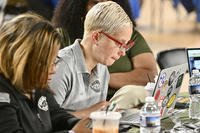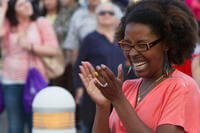Military families are a cross-section of the American population, facing the same problems and overcoming the same obstacles. Hispanic military families make up 16% of the active-duty military population, according to 2019 Defense Department data, and they are the fastest-growing population in the military. Many of these families face a language barrier, which becomes a bigger problem when their service member deploys.
But the military community is known for supporting each other, and these five military spouses are working hard to make a difference in the spouse community.
Janet Sanchez
A military spouse and mother, Janet Sanchez created a Facebook group in 2007 to provide a place for Hispanic military families to get resources and support. The group, Esposas Militares Hispanas USA Armed Forces, helps military families that face language barriers, and they also support victims of domestic violence through relocation.
Sanchez, whose husband retired from the Army three years ago, said the initial goal for the group was to eliminate language barriers and isolation in the military community.
"As soon as we started the group, the goal was achieved," she said. "The military spouses started to feel confident in their own language and felt listened to and supported."
The group, which has almost 70,000 members, supports spouses by offering educational programs, language classes, financial planning, employment readiness and community connections.
Sanchez, who also served in the Army, said she loves it when members share success stories, especially when a spouse uses the citizenship class offered in the group and becomes a citizen. Or when a spouse gets a remote job, uses a scholarship from the group to finish school or takes the steps they need to feel safe from domestic violence -- all because of the opportunities and resources available from the group.
"Our next project to tackle is advocacy about domestic violence in the military community, GED classes for military spouses that have not finished high school and, of course, continue to empower military spouses to grow professionally and personally," Sanchez said.
Verenice Castillo
When she came to the United States from Mexico at age 16, Verenice Castillo had to learn a new language and a new culture. Neither of those things stood in her way, and now she is one of the biggest advocates for new military spouses in the community.
"When I was a brand-new spouse, I felt alone," Castillo said. "I never thought the military would become my new family. It's hard to know how great it is going to be at the beginning."
Castillo, an Air Force spouse, jumped in with both feet. She started volunteering, became a key spouse and helped develop training programs that later were adopted by the Air Force. She felt she could do more to help, so she kept mentoring new spouses. Eventually, the mentorship program grew so large that she was almost forced to start a nonprofit so she could provide the services to all branches -- and the Military Spouse Advocacy Network (MSAN) was born.
MSAN now has three ways of helping military spouses: the Military Spouse Leadership Development program, a peer-to-peer mentorship program that is available to all spouses and a virtual mentorship hub.
"Our lifestyle is challenging, but people need to hear the good stories," Castillo said. "Those stories will help bridge the divide. The things we're doing in the community -- not just focusing on what we don't have, but what we have -- help the stigma when people view us as entitled military spouses. It's important that they see Hispanics are doing something good in the military community."
Becky Hoy
An Army spouse, Becky Hoy really struggled during her spouse's first deployment. But during that separation, the first of many over her 10 years of military marriage, Hoy shifted her mindset.
"I realized this was just going to be my reality. [I'm] going to have to learn how to live with deployments, rather than wishing away all those days," she said.
Hoy took her experiences with deployments and created a care package for her best friend, when she was facing her spouse's first deployment. It was full of self-care treats, journals, self-development books and care-package kits. Hoy's friend loved it. And, from that gift, Hoy launched Brave Crate in May 2018.
Beyond making deployments a little easier on military spouses, Hoy partnered with popular military spouse blogger Jo, My Gosh to build the Pillar Retreat -- a virtual retreat that brings deployment resources to military spouses. Hoy said their goal is not just to have resources available, but to make sure that everyone knows they are welcome to attend.
Related: Connect with Other Military Spouses Through These Fall Events
"Pillar is inclusive and welcoming, and we want spouses to know that we've intentionally created a space for their participation," Hoy said.
One of the ways they've done that, in their second year of the Pillar Retreat, is to offer a Spanish-language translation of the digital guide. Hoy, who is half-Cuban, is proud of being able to offer this as she sees more military families whose first and primary language is Spanish.
"Hispanic families have a sense of importance of communication; we're very communicative," she said. "As milspouses, we lose a bit of that as we travel and move. It's very important to me to create a communal space for milspouses online, that they can take with them wherever."
Jasmin Cruz
"They don't expect people like me, a second-generation immigrant, to accomplish things like this," Navy spouse Jasmin Cruz said. "I'm a Latina tech founder, and I am really proud of it."
Cruz created MilsoMuster, a smartphone app for military families, after being thrust headfirst into military life and a deployment at the same time. In 2016, Cruz's husband enlisted as an undesignated airman in the Navy and originally had follow-on orders for Japan. But the week he was graduating, his orders changed, and he was assigned to a carrier that was deploying that same week.
A week and a half later, he was gone for eight months, and Cruz was left to figure it all out on her own. A new duty station, a new lifestyle and no idea what questions she should even be asking.
"That experience taught me that there was not real support at a personal level or family members, I wanted to create something that gave them a safe space to ask, and the content to help them figure it out," she said.
Cruz didn't want to start a blog, so she decided an app that shared content already created, like blogs, podcasts and books from other spouses, was the route she wanted to take.
Evie King
As one of the prominent faces behind InDependent, an online wellness platform for military spouses and first responders, Evie King has been helping military and first-responder spouses figure out what they want to explore and find the time to do it for years. She said she got the push to do that from her mother, who is Puerto Rican and spoke Spanish as her first language.
"She's always trying different things," King said. "She has just instilled in me this idea of always learning. Always learning, always exploring, embracing where we're at. It's something that I try to live, no matter where we're at."
King feels connected with her ancestors when she cooks Puerto Rican food and has been working to learn the recipes.
"I'm trying to live my heritage now," she said.
King does this by listening to Puerto Rican artists, looking for cookbooks and reading new stories about Puerto Rico.
King and her active-duty Army husband are living in Germany. They attended a Latin festival just a few weeks after their arrival, and she said it felt very natural to be there.
When speaking of her work with InDependent, King shared that one of the interviewers is a Mexican, naturalized citizen who shares how to make our military spouse community more inclusive for people who are non-English-speaking natives or people of different demographics. King said many spouses may not know how to welcome them or understand the challenges they are going through, and she thinks this discussion will help.
InDependent has worked hard to include military spouses -- and first-responder spouses -- of all backgrounds and make it as inclusive and welcoming as possible. King is looking forward to doing more in the future.
--Rebecca Alwine can be reached at rebecca.alwine@monster.com. Follow her on Twitter @rebecca_alwine.
Keep Up with the Ins and Outs of Military Life
For the latest military news and tips on military family benefits and more, subscribe to Military.com and have the information you need delivered directly to your inbox.




























